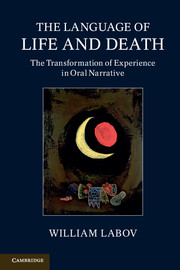Book contents
- Frontmatter
- Contents
- Preface
- Acknowledgments
- 1 Introduction to the language of life and death
- 2 Narrative analysis
- 3 The escalation of violence
- 4 Confrontations with death
- 5 Premonitions and communication with the dead
- 6 Margie Knott: “Her confrontation with the neighbors”
- 7 Gloria Stein: “They stoned the house”
- 8 Rose Norman: “The death of her younger sister”
- 9 Mary Costa: “The death of her youngest daughter”
- 10 Cache County
- 11 The vernacular origin of epic style
- 12 Historians' use of narrative
- 13 Thomas Babington Macaulay: “The death of Monmouth”
- 14 S. T. Bindoff: “The death of Elizabeth”
- 15 2 Samuel: “The death of Absalom”
- 16 The narrative view of death and life
- References
- Index
11 - The vernacular origin of epic style
Published online by Cambridge University Press: 05 June 2013
- Frontmatter
- Contents
- Preface
- Acknowledgments
- 1 Introduction to the language of life and death
- 2 Narrative analysis
- 3 The escalation of violence
- 4 Confrontations with death
- 5 Premonitions and communication with the dead
- 6 Margie Knott: “Her confrontation with the neighbors”
- 7 Gloria Stein: “They stoned the house”
- 8 Rose Norman: “The death of her younger sister”
- 9 Mary Costa: “The death of her youngest daughter”
- 10 Cache County
- 11 The vernacular origin of epic style
- 12 Historians' use of narrative
- 13 Thomas Babington Macaulay: “The death of Monmouth”
- 14 S. T. Bindoff: “The death of Elizabeth”
- 15 2 Samuel: “The death of Absalom”
- 16 The narrative view of death and life
- References
- Index
Summary
In the humanities, we are not often so fortunate as to find both a clear question and a clear answer to that question. I take as such a case the solution to the problem posed in Wolf's Prolegomena of 1795: was there a single poet named Homer who composed the 15,000 lines of the Iliad, and, if so, how could he do this before writing was invented? The question was not answered by the discovery that the Linear B script of Crete, which antedated Homer, was Greek, since this script was used only for accounting, and never for literary purposes. It was not answered by the attribution of the text to many authors, since no agreement could be found as to which part was to be attributed to which Homer. It was answered by Milman Parry and Albert Lord, who showed that the Homeric poems replicated the characteristics of the oral narrative poetry of contemporary Yugoslavian bards. The oral composer makes use of ready-made formulas for fitting proper names into meter; of repeated themes as a guide to oral compositions of indefinite length; and a variety of dialect forms inherited from the models on which his poem is based. Lord sums up the crucial discovery in this way:
I believe that the greatest moment in recent Homeric scholarship was expressed by Milman Parry when he wrote his field notes for his collection of South Slavic texts and spoke of his growing realization that what he had been calling traditional was in fact oral.
- Type
- Chapter
- Information
- The Language of Life and DeathThe Transformation of Experience in Oral Narrative, pp. 176 - 185Publisher: Cambridge University PressPrint publication year: 2013



